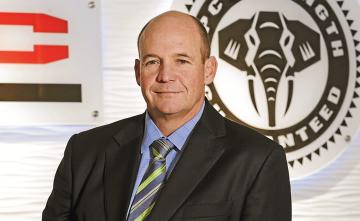PPC's Zimbabwe cement plant nears completion
 PPC's Ceo Darryll Castle suggested it was business as usual on the cement site, even though the rest of the Zimbabwean economy is in a tailspin.
PPC's Ceo Darryll Castle suggested it was business as usual on the cement site, even though the rest of the Zimbabwean economy is in a tailspin.
PPC's cement plant in Zimbabwe is on track for completion this year — with SA’s largest cement maker aiming to increase sales in the rest of Africa.
Speaking recently on the sidelines of the company’s extraordinary general meeting, at which shareholders approved PPC’s proposed R4bn rights issue unanimously, CEO Darryll Castle suggested it was business as usual on the cement site, even though the rest of the Zimbabwean economy is in a tailspin.
The mill, which is expected to add 700,000 tonnes to PPC’s annual capacity, was crucial to reducing the company’s costs, he said.
“Even if the volume is not required because Zimbabwe’s economy slows, the project still makes sense from a cost-optimisation process.”
Despite Zimbabwe’s economic collapse, PPC has been there since 2000, and its plants there are among the most modern in Southern Africa, serving both Zimbabwe and neighbouring export markets.
The Zimbabwe mill is one of four plants SA’s largest cement maker is building in the rest of Africa to increase sales as growth in its home country slows. It is also one of the reasons PPC is launching the proposed R4bn capital raising, as the company said in May it had drawn down on project funding needed to complete the Africa expansion.
The principal reason for the capital raising is to alleviate short-term pressures on its balance sheet, with the company’s debt expected to peak at between R10bn and R12bn by 2017. PPC’s debt is sitting at R9.2bn, which is almost twice the size of its market value of R4.9bn at Monday’s close.
That virtually all shareholders who attended the company’s extraordinary general meeting on Monday voted in support of the proposed rights issue came as no surprise to the cement maker’s boss. “Shareholders are generally supportive of what we have to do. They know what is happening is in their best interests,” Castle said.
The extraordinary meeting was called in May after S&P Global Ratings slashed the company’s rating to junk, placing pressure on the cement maker to immediately pay out its bond investors. The company’s note holders rejected the option of a 90-day delay to their redemption, even if it came with a sweetener.
In July, PPC paid the R1.6bn due to the bond investors with bridge financing it secured from local banks — at a hefty interest rate of the Johannesburg Interbank Average Rate plus 10%, that PPC said it would repay with the proceeds from the rights offer.
The company, however, remained cagey about the fees it would pay to the banks that are underwriting its upcoming rights issue.
Castle said only once the entire transaction had been bedded down could the company have a full and final view of what the fees would be.
“To talk about fees at the interim stage would be talking without certainty,” he said.
A detailed circular outlining the fee structure would be issued later in August, he said.
Consultancy Deloitte says investment in African mega-projects has surged in recent years, despite the aftershocks of the global financial crisis.
Given the poor state of SA’s construction and engineering environment, and a stagnating domestic economy, more SA companies are looking to the rest of the Africa for returns.
PPC has invested heavily in Rwanda, Ethiopia and the Democratic Republic of Congo (DRC), to derive 40% of turnover from the rest of Africa by 2017.
Most Popular
Big sub-Saharan African economies to get potent lift this year
Sub-Saharan Africa’s biggest economies will benefit from a global upswing this year - as long as the U.S.-China tariff dispute does not disturb improving global trade flows, a Reuters poll ... Full story











